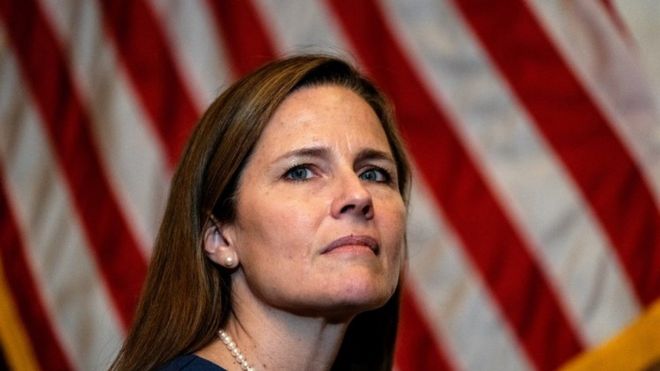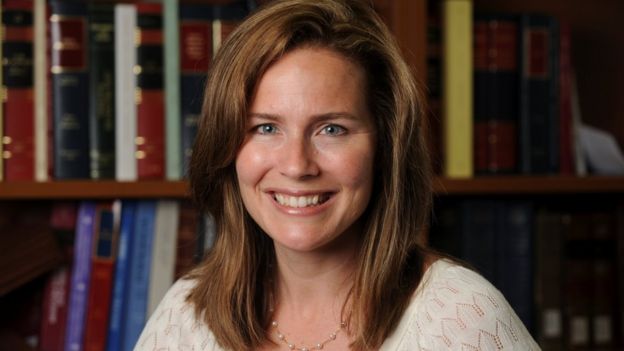Amy Coney Barrett, US President Donald Trump’s Supreme Court nominee, is to go before the Senate Judiciary Committee for what could be a fiery confirmation hearing over the next four days. The 48-year-old conservative jurist has vowed to judge legal cases impartially. Democrats have criticised the moves by Republicans to force the confirmation ahead of the 3 November presidential election and amid coronavirus concerns.
Judge Barrett’s approval would cement a conservative majority on the top court. Conservative-leaning justices would then hold a 6-3 majority, shifting its ideological balance for potentially decades to come. President Trump picked Judge Barrett to replace liberal Justice Ruth Bader Ginsburg, who died last month aged 87. The Republicans – who currently hold a slim majority in the US Senate, the body that appoints Supreme Court judges – are now trying to complete the process before Mr Trump takes on Democratic rival Joe Biden in the election.
The court’s nine justices serve lifetime appointments, and their rulings can shape public policy on everything from gun and voting rights to abortion and campaign finance. Democrats fear Judge Barrett’s successful nomination would favour Republicans in politically sensitive cases that reach the Supreme Court.

What will Judge Barrett say in her opening remarks?
In what is effectively an interview for the job, the confirmation hearing will give Judge Barrett a chance to explain her legal philosophy and qualifications for the lifetime post. In prepared remarks released ahead of Monday’s meeting, Judge Barrett thanks President Trump for “entrusting me with this profound responsibility”, which she calls the “honour of a lifetime”. In the speech, Judge Barrett will speak of the importance of her family and how her parents prepared her for a “life of service, principle, faith, and love”.
Judge Barrett will pay tribute to judges she has worked with, including former Supreme Court Justice Antonin Scalia. Justice Scalia’s reasoning “shaped me”, Judge Barrett will say. “His judicial philosophy was straightforward: A judge must apply the law as written, not as the judge wishes it were.”
Judge Barrett will say she has “resolved to maintain that same perspective” in her legal career. It is up to elected politicians to make “policy decisions and value judgments”, not Supreme Court justices, Judge Barrett will say. “In every case, I have carefully considered the arguments presented by the parties, discussed the issues with my colleagues on the court, and done my utmost to reach the result required by the law, whatever my own preferences might be,” she will say. “When I write an opinion resolving a case, I read every word from the perspective of the losing party. I ask myself how would I view the decision if one of my children was the party I was ruling against.”

What about the coronavirus concerns?
The hearing room has been prepared in consultation with health officials to ensure that social-distancing rules will be met. Two Republican senators on the committee, Mike Lee and Thom Tillis, have recently tested positive, and have not said how they plan to be taking part in the proceedings. Meanwhile, Senator Kamala Harris, the Democratic vice-presidential nominee who is also a panel member, has said she will participate remotely.
What’s the confirmation process?
After the hearing ends, any committee member can require an additional week before the formal vote. It is not clear if the members will be able to vote remotely. After that the Senate – the upper chamber of the US Congress – will vote to confirm or reject Judge Barrett’s nomination. Republicans already appear to have the 51 votes needed to get Judge Barrett confirmed.




